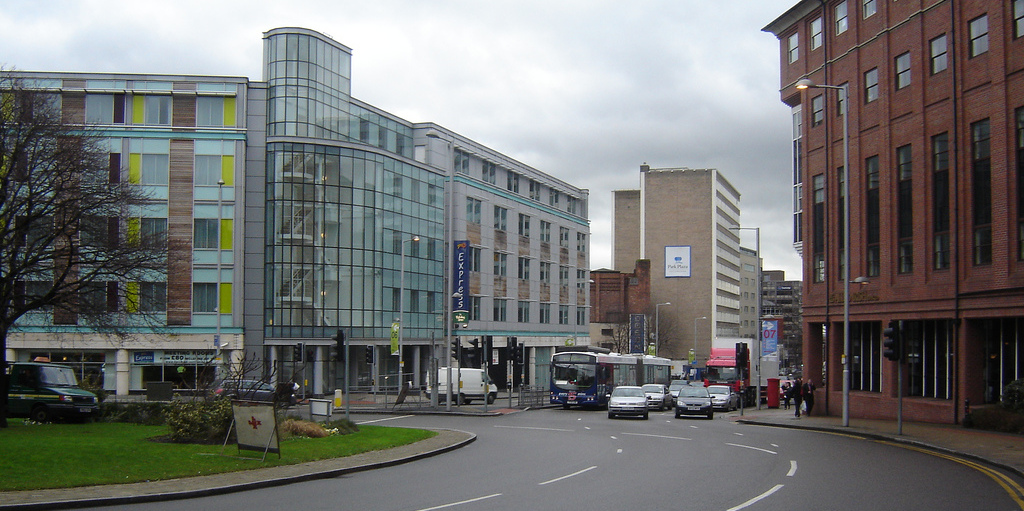
February 25, 2014, by ICCSR
Maid Marian, Banks and Marco Polo
Stefan Gold’s first impressions of Nottingham
A few months ago, the only things I knew about Nottingham were The University of Nottingham and the adventures of Robin Hood retreating to Sherwood Forest with some like-minded people to oppose the villainous Sheriff of Nottingham. During my first visit, it was Maid Marian that I encountered first, as I checked into a hotel on Maid Marian Way. I needed two days and one visit to the oldest pub in England to get used to the idea that a four lane road, totally overcrowded during rush hour, is named after this legendary maiden. In contrast, Robin Hood Way meanders near the banks of the River Trent, as I found out later. These and some other thoughts occupied my mind when I arrived here in Nottingham for the first time from the University of Neuchâtel, in Western French-speaking Switzerland.
Over the last few weeks I have settled in Nottingham and become acquainted with my professional home in the North Building of the Jubilee Campus. I have been absorbing many of the astonishing things one inevitably comes across when immersed in a new culture. Except for a few short conference stays, England was a blank for me, that is now going to be filled. In several aspects my arrival went unexpectedly smoothly due to the effective advice and assistance from many sides, however my attempts to open a bank account – I was naively optimistic – soon found me in the midst of an obstacle course. Proving my address looked for some time as a classic catch-22, however after two weeks I was finally the happy and proud holder of an English bank account.
My research journey started at the Institute for Ecological Economy Research (IÖW) in Heidelberg, Germany in 2006; since then the question of sustainable production and sustainable products and services has occupied my mind. How production (use and disposal/recycling) of goods may be organized in a way that fulfils individual customer requirements and simultaneously secures inter-regional and inter-generational equity? It is natural that this issue transcends corporate boundaries and requires broader perspectives to be tackled, basically a systems view. As a PhD student and research assistant at the University of Kassel (Germany), I came across the perspective of supply chains and I chose this perspective as overarching paradigm. After my years of apprenticeship in sustainable Supply Chain Management (SCM) at the University of Kassel, I broadened my knowledge about SCM at the University of Neuchâtel as post-doc and lecturer, while keeping a distinct focus on the sustainability issues often intimately linked to supply chains.
Supply chains, even cross-continental ones, are not a modern phenomenon; however, without a doubt they are a phenomenon that has become ubiquitous – and widely debated – nowadays. Marco Polo, for example, was the trendsetter for today’s intense Chinese-European trade and division of labour along intercontinental supply chains (and value chains respectively). Business followed adventure. The Suez Canal replaced the dangerous Silk Road and container ships have replaced traditional pack mules. Today, the melting arctic ice shield shortens sea routes, which brings – besides conflicts – the continents even closer together, at least logistically. In any case, supply chains (with their processes, institutions, actors, relationships, configurations, organisations, and patterns of sense-making involved) are a canvas to reveal the specific challenges of sustainability in today’s (global) economy and society. My current research is in particular directed towards supply chain collaboration, the challenge of making food supply chains sustainable, base of the pyramid (BoP) business models (that have largely neglected the supply chain perspective so far) and humanitarian logistics.
I am glad to have the chance to work at the International Centre for Corporate Social Responsibility (ICCSR); I hope that discussions and joint research with colleagues in Nottingham and abroad inspire new intriguing theoretical levers and empirical application fields to embrace the challenges of today’s production and consumption systems.
By Stefan Gold
Lecturer in Sustainability Management, Systems and Reporting
ICCSR, Nottingham University Business School
Image: Maid Marian Way, Nottingham by Dafyd Jones reproduced under creative commons licence (CC BY-NC-SA 2.0) Source: http://www.flickr.com/photos/dafyd/404755142
No comments yet, fill out a comment to be the first

Leave a Reply